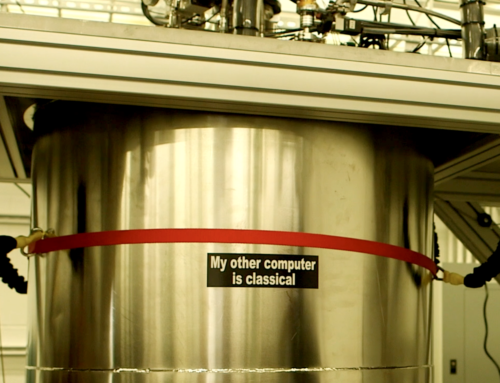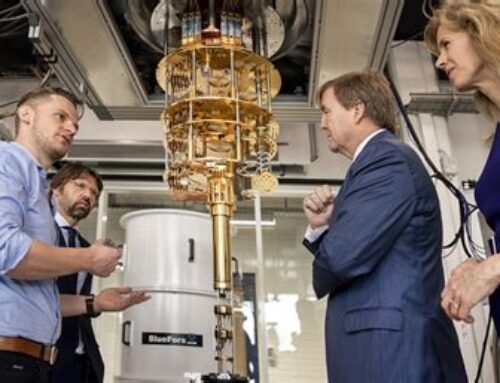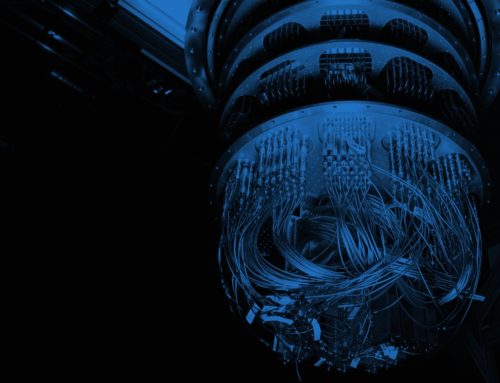Feature image via Quanta Magazine
Stephanie Wehner has an impressive resume, to say the least. The German physicist and computer scientist is currently leading Europe’s Quantum Internet Alliance on its mission to build a quantum internet. She is the Roadmap Leader of Quantum Internet and Networked Computing at QuTech, a research centre for quantum computing and the quantum internet at Delft University of Technology in the Netherlands, Co-Founder of QCRYPT (the largest annual international conference on quantum cryptography), and Coordinator for the Quantum Internet Alliance of the EU Flagship, as well as an Antoni van Leeuwenhoek Professor at QuTech, Delft University of Technology. And that is not even mentioning her previous accomplishments and accolades.
We recently sat down with Stephanie to discuss the project’s advancements, future use-values for a quantum internet and the challenging ethics of building a network that will enable un-hackable communications.
The following interview has been edited for clarity.
Why are you building a quantum internet?
We are working on building a quantum internet because you can do things with a quantum internet that you cannot do on the internet that you have today.
Of course, the most famous application of quantum communication is secure communications. That’s proof that you can have security that even a quantum computer can never break. But that’s not the only reason why we do it. There are a few other cool things you can do with a quantum internet. For example, if you can imagine that in some years we actually do have quantum computers, then people think the first application of such a quantum computer could be to simulate, say, a new material design. But maybe we will only have this technology here at QuTech and a few other places. One way for you to use such a quantum computer would be to send your material design to us, then we would do the simulation for you and then tell you what the result is. But maybe you don’t want to tell us your material design, given that it might be proprietary. And so the question is, can you perform such simulations and can you use the remote quantum computer in such a way that you don’t have to give away your proprietary design or any other secrets that you want to involve in this computation? And the quantum internet makes it possible to use a very simple quantum device, a quantum terminal, to access a remote quantum computer in such a way that this quantum computer cannot learn what you’re doing. So, it cannot learn what your proprietary material design is, it cannot even learn if you’re doing a simulation or factoring a number—it cannot tell the difference.
There are a few other nice applications. For example, one can synchronize clocks more accurately. One can keep data more efficiently in sync in the cloud. That’s maybe something that is not so obvious to you actually as a user, but you would certainly know if it goes wrong.
Let’s imagine an extreme example: let’s say that you have a million euros in the bank. And the data is, of course, stored somewhere. So, somewhere there’s a database that says that you own that one million euros. So, you can imagine that if you went to the A.T.M. to withdraw money, maybe the system crashes when you withdraw. And usually for redundancy purposes, of course, the data does not exist only in one location because, you know, if the computer burns down, then no one remembers who owns any money. It’s replicated in a few locations. But it might happen that if you don’t employ such consistency protocols, that if your system crashes during withdrawal, then computer one now says you own one million euros and computer two now says you own zero euros. So now the question is, who is correct? So, it’s a very important problem actually to keep data consistent in the cloud so that you don’t run into these kinds of issues.
I understand that one of the most important aspects of a quantum internet is that it will enable ultra-secure communications, which is obviously a huge benefit for state-actors, banks and big corporations. But what are some impacts a quantum internet might have on broader civil society?
I think keeping data consistent, for example, is not something totally big business. I think it’s very difficult to predict the future. The internet that we have today was originally meant to share some files around. And that’s great, but then you might also ask why would I, at home, ever share a file? At that point, in fact, people didn’t even have a personal computer at home, so, what are these files that you’re talking about?
So, we cannot predict all the applications that a quantum internet will have. People have used it also, for example, to cheat an online bridge game with entanglement. Which, of course, is a bit obscure but it may hint that there are many more things one can do with it. But I think if people don’t have access to it, then this will also not come.
A lot of the applications that we run on the internet today were not developed by people somewhere in the 60s where they wrote on the whiteboard and said, “these are all the applications, and now we’re going to build this thing”. But rather, there were people who were engaged with their technology and played around and wanted a social forum and to see whether it could be possible.
To begin with, I know the quantum internet you’re building will have a very limited scope but do you envision this being something that will be accessible to everyone in the future?
I certainly hope so, absolutely. I think the question is just a little bit, when? So, we’re building a small demonstration network here in the Netherlands, where we also have an effort to make it accessible for people. But that will only happen in two or three years because it’s very difficult to have something stable enough that you can begin to do that.
We also already have a quantum internet simulator. It’s a little program that you can install on your computer and you can have something like a pretend quantum internet. And we are using it, actually for a Hackathon next week, together with RIPE NCC (RIPE is the regional internet registry in Europe), and this time it’s actually a pan-European version. So, there will be a few teams across Europe—one here, one at CERN, one in Dublin and a few other places across Europe. And they’re going to basically work together on our “pretend quantum internet” to explore a few things one can do with it.
Given the lessons that we’ve learned from the development of the classical Internet, what sort of legal or ethical challenges do you think future frameworks and regulations for a quantum internet might consider? And are these unique from the challenges that are posed by the classical internet?
To be honest, I think there are other people who are more capable of answering this question. I’m a researcher, I’m not a lawyer and I’m also not a specialist in ethics. Given this position, I can give you a few issues, even though maybe I am partially critical about them myself.
On the one hand, there’s a lot of discussion about standardising various technologies. Which, of course, is very important eventually. On the other hand, I’m also a little bit critical about this because if you start to write standards too early, you constrain the development. Another aspect is the impact of having fundamentally un-tappable communication. That is a question that is maybe not even totally unique to quantum networks. Of course, only quantum networks can deliver fundamentally un-tappable communication, but it also arises to a lesser extent with existing encryption technologies that people might be using.
So, is that a good thing or a bad thing? On the one hand, it’s a very good thing because one can protect government secrets and everyone’s secrets with absolute security. But of course, security always has two sides. If you have a mechanism to make something more secure, it can in principle be used by anyone. It can be used for good, but it can also be used for bad. So that is a little bit of a trade-off between these two things.
I am personally of the opinion that you cannot stop progress. So, you can say, “I’m going to forbid this.” But then people will do it anyway. It’s not possible to forbid technology.
The reason I think a lot of us maybe have some mixed feelings about this is the sense that it’s already super hard to realise that technology. It’s already so hard! So, putting some extra barriers is a very scary thing, right?
There’s been a lot of talk recently about Google’s claim to have achieved quantum supremacy, as you know. But, of course, the reality is that for the most part, quantum computers will work in concert with classical computers, not replace them. In what ways will the quantum internet interact with or rely on existing “classical” technologies?
So, maybe to talk about the term quantum supremacy? In quantum communication, quantum supremacy has been achieved many years ago. Because any QKD implementation basically shows quantum supremacy. So, a quantum internet is not supposed to replace the classical internet but rather, supplement it with some extra functionality that you otherwise don’t have. Because, if you say I’m watching a movie on Netflix, there’s no reason why we would send it via qubits. Maybe in the far future when everything is so far advanced, we could need to do everything in one system. But in my lifetime, I don’t expect this. In all known application protocols for quantum, with a secure communication or say secure quantum computing in the cloud or everything else, you need the quantum network, but you also need to send some classical data around.
So, do the networks overlap or do they sit separately?
That’s a good architecture question. Do they follow sort of the same pattern? They don’t need to follow the same pattern on application level, not at all. On the elementary level—on the control level—whenever you have two quantum nodes that wants to make quantum entanglement, for example, they also need to be able to talk to each other classically, to synchronize.
And is this done using hardware or software?
It’s done through hardware and software, actually, on what is called the physical layer. So next to a quantum channel you always have a classical control channel but it is not visible for the user. But this sort of user-level communication classically could be done also by the standard internet and next to the quantum topology.
What kind of support has this project received on a local, national and regional level as well as privately?
We have a lot of support from the from the Netherlands, actually, both through QuTech, which is a national Icon program from the Ministry of Economic Affairs in the Netherlands and also NWO, which is like the Dutch NSF of the U.S. We also have some amount of research funding from the EU, both from the European Research Council and to a lesser extent from the quantum flagship, which is the EU initiative. We are also the coordinator of the European Quantum Internet Alliance where we work together with some other nodes in Europe.
We also have various industry engagements, for example, we work together with KPN, which is the Dutch Telecom. We also talk to a lot of parties in the classical domain. For example, The Hague Security Delta, which is sort of an umbrella organisation of 80 security companies in the Netherlands. That’s very convenient for us because we don’t have to talk to each of them individually. So that’s very valuable for us. We also talk to a few other private entities in the Netherlands. We also have relations with industry partners on the component level, for example, with Toptica who makes laser systems. Then there’s OPNT that does timing control, JPE that does stabilisation. So, this is on the component level where we work with a lot of industries to do specific things for our quantum network. We also work with industry which is more interested in the use case if you were to go to the other extreme of the spectrum. For example, with SAP, which is a German software company. With these companies, the interest is more about what you can do with the technology.
Another useful thing to mention is that there is also RIPE NCC, which is the regional internet registry of Europe. And that’s actually pretty cool for us because they’re an organisation that brings together all the large telecom operators and internet providers in Europe. They are responsible for managing the numbers on the internet and there cannot be a computer anywhere in Europe that does not have a number from RIPE. But they also do a lot of community development and education of their members.
I know you set the deadline for end of 2020 to have this completed, how’s your progress tracking now?
So, we will have one link by 2020 but we do not have the four nodes yet. We want to have three in 2021 and maybe all four in 2022.
Have there been any surprise challenges that have created this delay?
Of course, there are some technical challenges which took us longer. And, of course, there were also some mundane challenges. We have also decided we would like to deviate from the four-city plan because we would like to put one node somewhere we can physically access it. Previously, we had said we’re going to put it in Leiden, Amsterdam, Delft, The Hague. But then we were thinking that somewhere in the building in Leiden there could be a node, but that it would be in one of these KPN-style buildings where no one can go in. So, this is why we want to put one of the nodes somewhere where you can actually see it. That might happen either here [in Delft] or in The Hague or in Rotterdam, we haven’t quite decided yet. The idea is that you would really have a terminal where you can see the node, otherwise you just have to believe us, right? We tell you, we promise that the node’s over there!







Leave a Reply